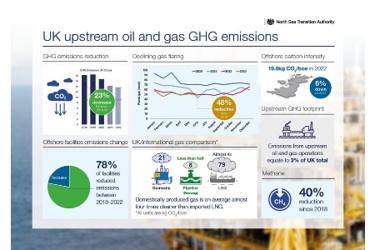UK North Sea Emissions Down Three Years In A Row

- Reduction achieved in 2022 despite increase in production
- Emissions reduction initiatives support net zero and UK energy security
- Halving emissions by 2030 is minimum NSTA expects from industry
Greenhouse gas emissions from UK offshore oil and gas production were cut for the third consecutive year in 2022 as industry continued its drive to reach net zero by 2050.
Last year’s estimated 3% reduction contributed to a 23% drop in greenhouse gas emissions between 2018 and 2022, according to the latest Emissions Monitoring Report from the North Sea Transition Authority (NSTA).
This industry remains well on track to meet targets to cut emissions 10% by 2025 and 25% by 2027, as agreed in the North Sea Transition Deal (NSTD) with the UK government in March 2021.
However, bold measures will be required to hit the key target of halving emissions by 2030 – the absolute minimum the NSTA expects from industry, which must strive to surpass this goal.
The NSTA warned last year that unless industry took positive steps, a likely rise in oil and gas production in 2022 would cause emissions to remain flat or temporarily rise.
However, industry investment in technologies which minimise flaring and fuel-efficiency initiatives meant emissions continued to fall, despite higher production than in 2021.
For example, an operator replaced components in a gas export compressor, lowering fuel consumption by 18 tonnes per day and saving 20,000 tonnes of CO2e of emissions per annum.
Emissions decreased on 78% of offshore facilities between 2018 and 2022, in some cases through permanent shutdowns, but for 59% of those, through active emissions reduction initiatives.
These measures not only support the UK’s net zero goals – they also bolster energy security by saving gas that can be used to keep lights on, homes heated and businesses running.
Although industry is making progress, there is more work to do. The industry needs to preserve its social licence to operate and the NSTA estimates that without further, sustained action, the sector will not meet the 2030 target of halving emissions.
While the carbon footprint of UK gas is on average almost four times lower than imported LNG, it is more than twice as large as pipeline imports from Norway, whose basin is similar to the UK Continental Shelf. The low carbon intensity of Norwegian gas should act as a spur to further clean-up UK production.
The NSTA will continue to hold industry to account on emissions by monitoring, tracking and benchmarking operators’ performance, sharing best practice and pressing licensees for relentless progress on flaring reduction, fuel efficiency and platform electrification schemes.
This is supported by the NSTA’s strategy, which was revised in 2021 to oblige industry to help the UK reach net zero by 2050. The NSTA subsequently began requiring operators to develop Emissions Reduction Action Plans for their facilities and issued tougher guidance stating all new developments should have no routine flaring and venting, with zero routine flaring across all North Sea platforms by 2030.
The approach is proving to be effective, not only in emissions reductions achieved, but since early 2021, NSTA interventions have contributed to preventing the emission of 3 million tonnes of lifetime CO2 equivalent, the same as taking more than 1.5 million cars off the road for a year.
Hedvig Ljungerud, NSTA Director of Strategy, said:
“There are some really positive findings to credit here including the year-on-year progress and active investment in new emissions reduction technology.
“However, we can’t hide from the fact that there is more work to do. The NSTA will steadfastly hold the sector to account on emissions, including its pledge to halve emissions by 2030, which is the absolute minimum we expect.”
Read the report here.
The NSTA’s Emissions Monitoring Dashboard can be accessed here.
NSTA analysts will present the main findings of the Emissions Monitoring Report during a seminar at Offshore Europe in Aberdeen. The seminar will take place from 10-11am on Wednesday, 6th September. There will be an opportunity to ask questions following the presentation. Find out more and reserve a place here.
Source: North Sea Transition Authority
